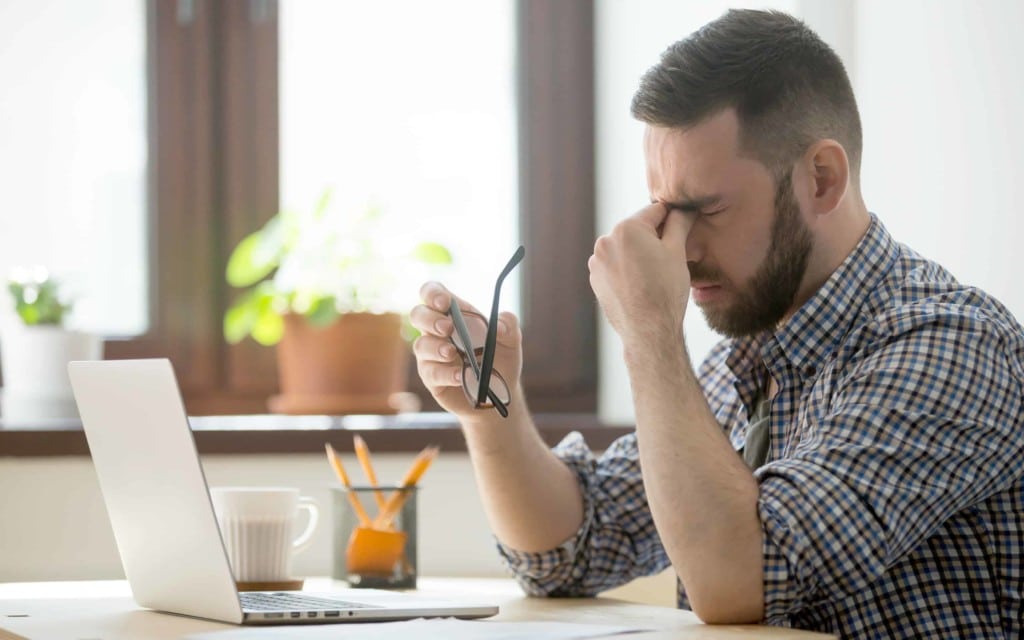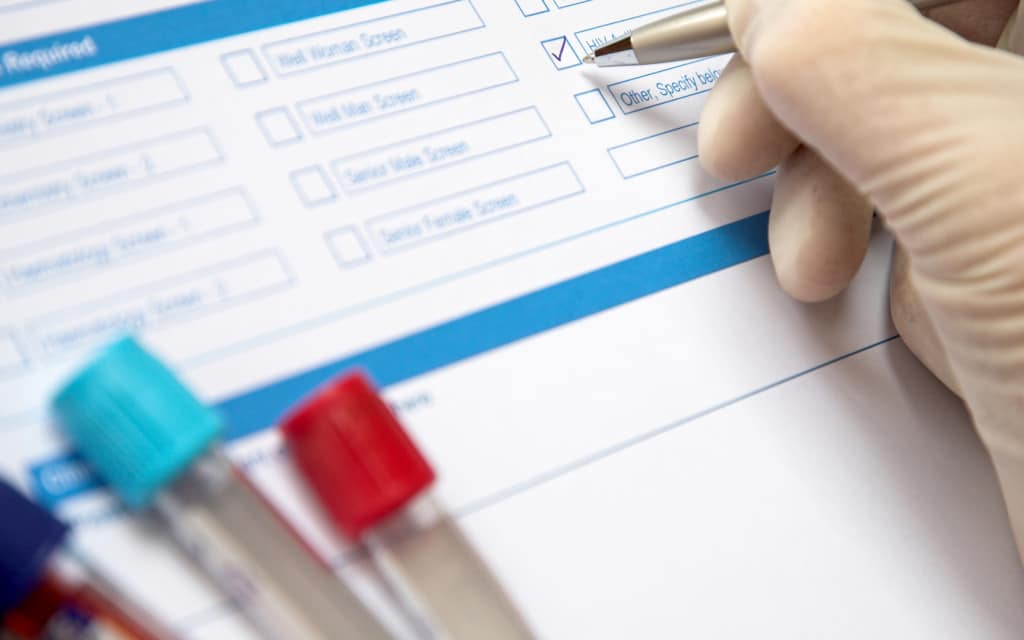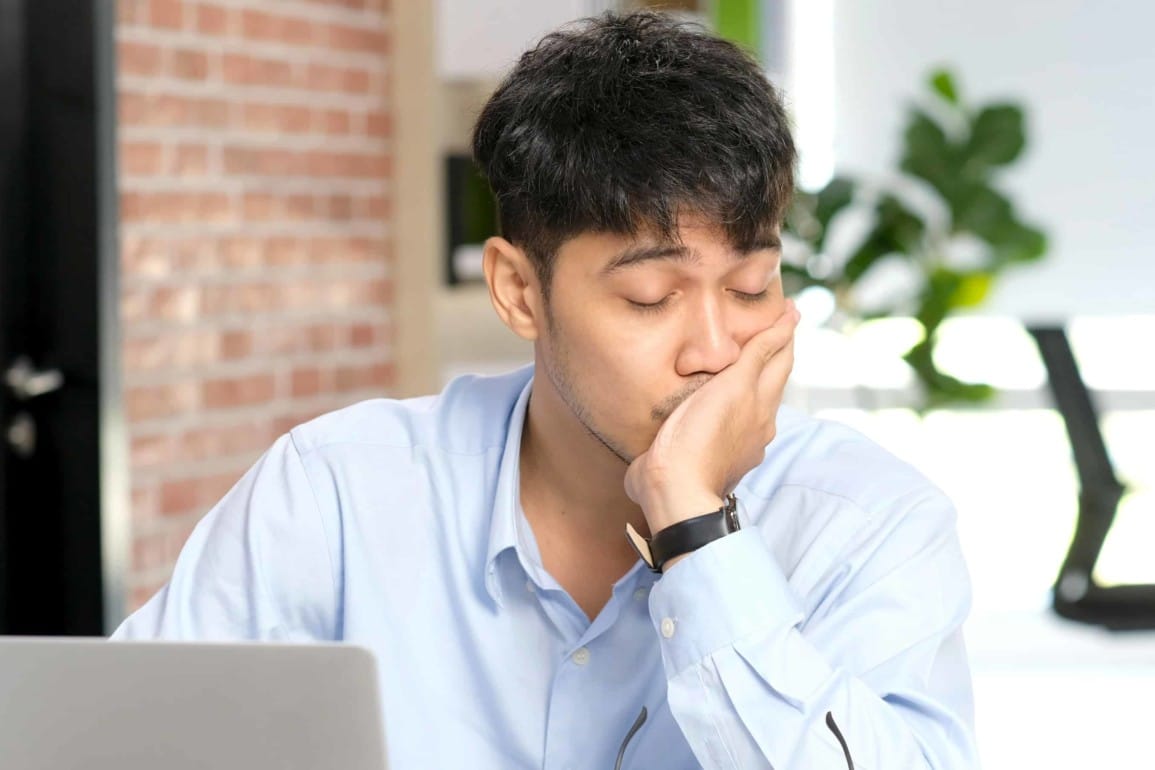Do you constantly find yourself nodding off when you’re sitting at your desk?
Maybe it’s hard to keep your eyes open when you’re riding the tube on the way home from the office?
While we all have days when we’re just sleepy, constant exhaustion could be a common sign of sleep deprivation. After all, the majority of us don’t get nearly as much sleep as we should in this fast-paced world.
Instead, we pride ourselves for our ability to stay up well into the early hours of the morning, responding to emails and getting work done.
You don’t need to be hallucinating or tripping over your feet to earn a sleep deprivation diagnosis either. Whenever you’re not getting the right amount of sleep to feel alert and awake, you’re technically sleep deprived.
Here’s your introduction to the signs of sleep deprivation, and how it can be properly diagnosed.

What are the signs of sleep deprivation?
Sleep deprivation effects come in many different flavours.
That’s because we all have our own unique relationship with sleep. Some adults need more sleep than others to feel rested each day.
Additionally, while some of us don’t experience many symptoms after a night with limited sleep, others will instantly begin to notice side effects, just after a lost hour or two.
The occasional interruption your sleeping pattern is normal — and little more than a nuisance.
However, if you have an ongoing problem with lack of sleep, then the effects can be much more severe. If you’re not sure whether you’re experiencing the signs of sleep deprivation — or you’re just a little bit more tired than usual, here are some red flags to watch out for.
1. You’re always tired
Obvious, we know, but if you’re constantly exhausted, then this could be one of the main signs of sleep deprivation. When you’re struggling with exhaustion, you’re likely to feel unproductive, sluggish, weak, and unable to concentrate.
You might have circles under your eyes that you can’t get rid of and keeping your eyelids open will feel like a challenge.
2. You’re impulsive
One of the reasons why sleep deprivation is dangerous, is that it makes you much more likely to act without thinking. You won’t be able to think through long-term solutions to problems.
Instead, your mind and body will be pushing you to do whatever you consider to be good for you right now. That could mean drinking several cups of coffee when you know you shouldn’t or eating unhealthy foods when you’re on a diet.
3. You’re starving
Speaking of the connection between the signs of sleep deprivation and food, when you’re exhausted, you’re also a lot more likely to feel hungry. That’s because you don’t have as much energy in your system, and your body will be trying to replenish it with calories.
At the same time, you’ll be craving higher calorie foods. Excess ghrelin in your body will make you want the foods that you shouldn’t be eating. Over time, this could increase your risk of problems like heart disease and diabetes.
You might even notice that you begin to gain weight, because your food-based decisions have you grabbing more fast-foods than fruits and veggies.
A lack of sleep can also have an impact on your metabolism. When you don’t have proper rest, your body doesn’t process food as quickly, which allows fat stores to build up.

4. You’re struggling with decisions
If you’ve been finding it harder than usual to solve problems and manage projects at work, then the problem could be a lack of sleep. Lost sleep can effect your higher-level cognitive processing.
This means that you won’t be able to handle things like time management and problem solving.
In one study conducted in 2009, scientists asked well-rested and sleep-deprived people to complete tasks that required rapid decision making. Between tests, the accuracy of those without sleep went down by up to 2.4%.
5. You keep getting sick
Another of the most common sleep deprivation effects you’re likely to notice straight away, is that you’re sick more often. If you’re not getting enough rest, then your body won’t be able to fight off infections as well as it usually could.
In particular, you’ll find that smaller ailments like colds are harder to shake off.
When you’re sleeping, your body produces important proteins called cytokines, which help to protect you against inflammation and infection. They are part of your cellular immunity.
A few nights of poor sleep could quickly lower your body’s defenses and make it harder for you to overcome pesky viruses.

6. You’re clumsy
You don’t have to be sleep deprived to be clumsy, but it helps. If you’re constantly stepping on your own feet, tripping over steps, or swerving to avoid things as you walk, then it could be one of the signs of sleep deprivation.
Perhaps you’re just too tired to actually focus on where you’re going.
When you’re exhausted, you automatically struggle to function on a neurological level. You end up with a lower reaction time, and your concentration begins to suffer too.
Walking up and down the stairs becomes quite a challenge, because you can’t totally judge where the next step is.
7. You’re very emotional
You’ve probably noticed in the past how emotional you can get when you’re not sleeping as well as you should be. Sometimes, your emotional response will start with something simple, like a bit of moodiness when things don’t go your way.
Eventually, you’ll start to become even more emotional than usual. Tiny things, like not being able to find a pair of matching socks, will send you into streams of tears.
It’s not just sadness that you feel when you’re sleep-deprived either. You also feel more fear, stress and anxiety than usual. That’s because the amygdala in your brain (the emotional section) becomes hyper-sensitive to all stimuli.
8. Your vision is blurry
Here’s another thing that can make it harder for you not to be a klutz when you’re sleep deprived.
When you’re fatigued, you can’t control the muscles in your eyes as well as usual. The result is that your vision becomes blurry and unfocused. You can’t control what you’re looking at, so your depth perception goes completely off-balance.
This is a pretty dangerous side effect for people in all situations, but it can be particularly problematic if you’re driving or operating pieces of machinery. It’s important to be very careful with what you do when you’re sleep deprived.
9. Your skin looks terrible
There’s a reason people say they’re “getting their beauty sleep” when they go to bed each night. Sleeping doesn’t necessarily make you prettier, but it means that your skin and other parts of your body look brighter, and younger.
Your face really starts to show your age when you’re sleep deprived, because you’re battered by dark circles, dryness and sometimes swelling.
Rejuvenating proteins like collagen can’t form as well in a sleep-deprived body, which means that wrinkles are more likely to appear on your face.
A study in the journal Clinical and Experimental Dermatology found that people who slept seven to nine hours a night had skin that was more moisturized. Their skin could also protect and heal itself better after being exposed to ultraviolet light, compared to those who slept five hours or less.

How is sleep deprivation diagnosed?
If those signs of sleep deprivation sound familiar, then it might be time to start looking into a sleep deprivation diagnosis.
Usually, when you approach your doctor with concerns about sleep deprivation, they’ll ask you to take some kind of test that will allow them to determine how severe your sleep issues are.
To begin with, you may be asked to maintain a written history of your sleep experiences in a log that you can share with your doctor.
Every night, you’ll need to note how many hors you’ve slept, as well as how many times you wake up during the evening, and how rested you feel when you wake up. It may be a good idea to keep an eye on how you feel through the day too, and how often you’re tempted to nap.
If you have a partner, ask them to let you know if you do a lot of snoring, stop breathing for short periods, or if you move around a lot during the night.
Depending on the kind of information you provide to your doctor, they may give you a sleep deprivation diagnosis straight away. Alternatively, they may also you to take part in a polysomnogram or sleep study.
In this test, electrodes will be placed at various points throughout the body, including on your face and scalp. You’ll spend the night in a sleep clinic where your breathing, blood pressure, heart rate, and other factors can be closely monitored.
Some sleep studies can also be performed in your own home.
A sleep study will allow your doctor to get a better insight into what’s actually causing your sleep disruption. This means you can come up with a strategy together that helps you actually overcome your disorder.
After all, you don’t just want a sleep deprivation diagnosis — you want a solution leading to a better night’s sleep.

Introducing the latest sleep deprivation test
As studies into the signs of sleep deprivation continue to progress, you may find that you’re eventually asked to take part in other kinds of tests. For instance, we know that sleep deprivation has a similar negative effect on the brain as heavy drinking.
Researchers have found that a blood test may help us to determine which biomarkers in the brain suggest a person may be sleep deprived. The scientists worked with volunteers who provided a sample of their blood after a night of being sleep deprived.
The researchers then analysed changes in the expression of various genes in those blood samples. They were able to identify 68 genes that were all affected by lack of sleep.
The scientists could determine with 92% accuracy, whether the blood sample came from a healthy, well-rested person, or someone who was sleep deprived.
The development of blood tests such as these could in future make it easier for people to find out whether they’re sleep deprived by just going to their local lab.
Maybe this could even mean you could use something similar to a breathalyzer or a diabetes dip test to see whether it’s safe for you to drive or operate machinery after a long night.
Do you need a sleep deprivation diagnosis?
Some people really will need a diagnosis to start actions towards a healthier sleep routine. Sleep deprivation can be very dangerous causing a number of symptoms, from exhaustion and trouble concentration, to problems with your appetite and immune system.
Keeping an eye out for the signs of sleep deprivation could help you to determine when you need to go to your doctor and enquire about a sleep deprivation diagnosis.
When both you and your healthcare professional understand you have a sleeping problem, you can work together on figuring out what the cause and treatment of your sleeplessness might be.
Getting to the root cause of sleep deprivation can quickly lead to unharmful and straightforward treatment options.
For some people, these will include cognitive behavioural therapy and other psychological treatments. For other patients, accessing the right amount of sleep may require medication and natural substances.
Don’t forget to check out our other articles here at Siestio.com for help understanding and overcoming sleep deprivation. Speak to your doctor if you’re concerned that you may have a sleep disorder.
Siestio. Sleep Matters.
Medical disclaimer
You must not rely on the information provided on our website as an alternative to medical advice from your doctor or other healthcare professionals. For more information read our full disclaimer here.







